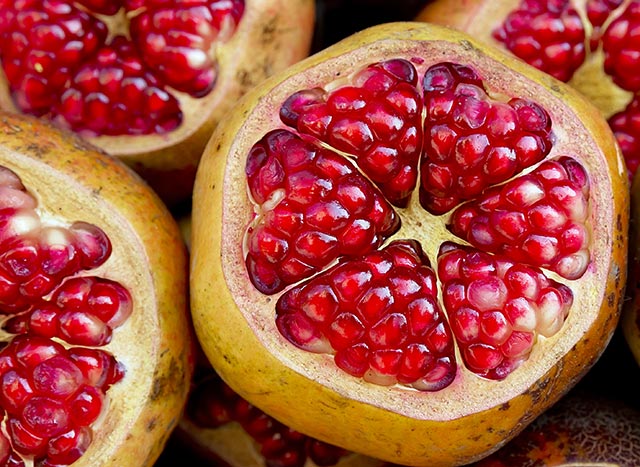Memory is impaired by prescription blood pressure meds, but pomegranate juice improves blood pressure and cognitive function
07/10/2019 / By Lance D Johanson

Struggling to find clinical benefits for statin drugs and blood pressure medications, a team of researchers put two drug protocols to the test to see their effects on human thinking and memory. The research, funded by the maker of the drugs (AstraZeneca), hoped to find cognitive benefits for candesartan and hydrocholorothiazide, rosuvastatin, or a combination of the protocols. The study was published online in Neurology, the medical journal for the American Academy of Neurology (AAN). The AAN represents the world’s largest association of neurologists and neuroscience professionals and is dedicated to promoting the highest quality patient-centered neurological care.
Neurologists find out that statin and high blood pressure meds do not improve oxygen-rich blood flow to the brain
The study found that the statin and the high blood pressure med were unable to slow declines in thinking and memory of human participants. Even though heart disease is closely linked to problems with thinking and memory, the statin and high blood pressure medications were unable to improve blood flow to the brain and slow cognitive decline over a six-year period.
“Heart disease has been linked to problems with thinking and memory, so we examined whether managing heart disease with medications like blood pressure and cholesterol lowering drugs can reduce some of those cognitive problems,” said study author Jackie Bosch, Ph.D., of the Population Health Research Institute and the School of Rehabilitation Science at McMaster University in Hamilton, Ontario, Canada.
The study included over 1,600 adults with an average age of 74. According to vital signs, all were determined to have a one percent chance of having a heart attack or other cardiac event that same year. At least 45 percent of the participants had stage two hypertension or high blood pressure. The participants were given physicals every six months and had to take thinking and memory tests immediately before the study, every six months, and after the six-year study period.
One group took a daily dose of 16 milligrams of AstraZeneca’s blood pressure med candesartan and 12.5 mg of hydrochlorothiazide. Another group took a daily dose of 10mg of rosuvastatin. The third group took a combination of the drugs and the final group took placebo pills. When compared to the placebo group, neither of the prescription drug protocols reduced cognitive decline over the six-year period. This brings up the question: Are the drugs addressing systemic inflammation of the epithelial cells that line the inside of the arteries? Are the drugs helping promote oxygen-rich blood flow to the brain and other organs? If memory and thinking do not improve while the drugs are used, are the drugs helping the arteries heal or not?
In any event, the study falls short because it did not compare the drugs with any true natural medications, such as pomegranate juice.
Pomegranate juice improves blood pressure, LDL cholesterol levels and memory and cognitive function
Pomegranate juice has been found to lower blood pressure, improve LDL cholesterol levels, while boosting memory and critical thinking processes. New research from Evidence-Based Complementary and Alternative Medicine finds that pomegranate juice can significantly improve verbal memory tests, while increasing brain activity for “critical task-related” regions of the brain. The benefits were observed in as little as four weeks and were tested against a placebo. Researchers used memory tests, MRI scans and blood draws to document significant improvements during verbal and visual memory tasks. This is because pomegranates possess a unique arrangement of antioxidants that drastically reduce oxidative stress and help unclog arteries.
In fact, a study published in the American Journal of Clinical Nutrition found that pomegranate juice can reduce plaques in carotid arteries up to 30 percent in a given year’s time. Those who did not drink the juice saw no benefit and actually saw an increase in arterial blockage as great as nine percent. Because pomegranate juice effectively reduces arterial plaques, those who drink it receive improved blood flow throughout their body, especially to the brain. The influx of oxygen-rich blood to the brain helps with verbal tasks, memory, and improved cognitive function.
The pomegranate study from Evidence-Based Complementary and Alternative Medicine concluded: “After 4 weeks, only the pomegranate group showed a significant improvement in the Buschke selective reminding test of verbal memory and a significant increase in plasma trolox-equivalent antioxidant capacity (TEAC) and urolithin A-glucuronide. Furthermore, compared to the placebo group, the pomegranate group had increased fMRI activity during verbal and visual memory tasks. While preliminary, these results suggest a role for pomegranate juice in augmenting memory function through task-related increases in functional brain activity.”
Neurologists should be recommending antioxidant-rich medicines such as pomegranate juice for improved blood flow to the brain, while calling for more studies to compare failing drugs with real medicinal foods.
Sources include:
Submit a correction >>
Tagged Under:
This article may contain statements that reflect the opinion of the author
RECENT NEWS & ARTICLES
COPYRIGHT © 2017 SUPER FOODS NEWS





















